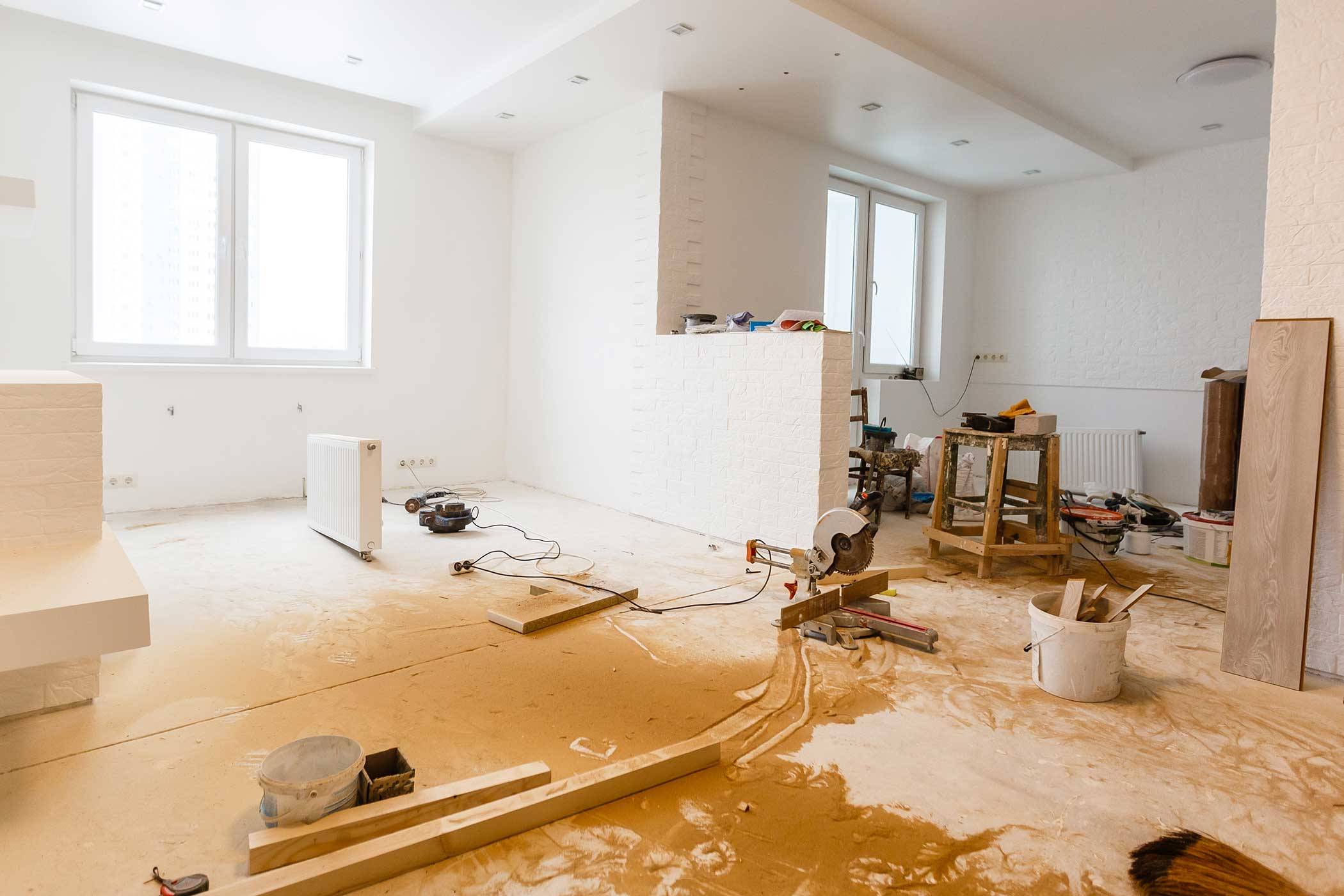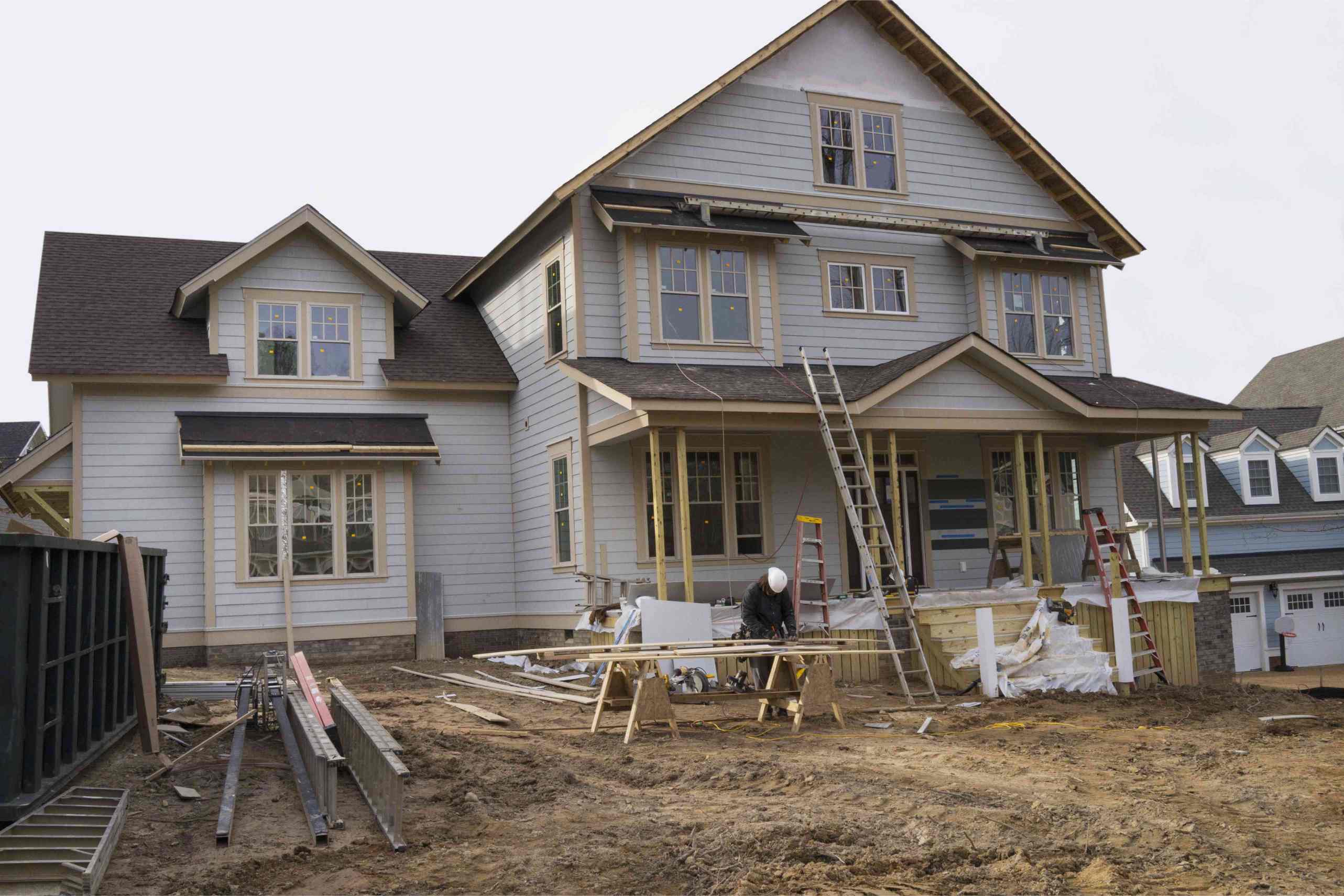Home>Renovation & DIY>Home Renovation Guides>How To Start A Home Renovation Business


Home Renovation Guides
How To Start A Home Renovation Business
Published: December 21, 2023
Learn how to start a successful home renovation business with our comprehensive guides and expert tips. Get all the resources you need to launch and grow your venture.
(Many of the links in this article redirect to a specific reviewed product. Your purchase of these products through affiliate links helps to generate commission for Storables.com, at no extra cost. Learn more)
Introduction
So, you've got a knack for transforming spaces and a passion for breathing new life into homes. You love the idea of taking a rundown property and turning it into a stunning, modern living space. If this sounds like you, then starting a home renovation business could be your ticket to a fulfilling and profitable career.
Whether you're a seasoned contractor looking to strike out on your own or a DIY enthusiast ready to turn your hobby into a business, the home renovation industry offers a world of opportunities. From kitchen remodels to full-scale home renovations, there's no shortage of demand for skilled professionals who can bring homeowners' dreams to life.
In this comprehensive guide, we'll walk you through the essential steps to kick-starting your home renovation business. We'll cover everything from conducting thorough research and planning to navigating the legal and financial aspects, creating a solid business plan, setting up your business, mastering marketing and networking, and effectively managing your operations.
By the end of this journey, you'll be equipped with the knowledge and confidence to embark on this exciting venture. So, grab your tool belt and get ready to dive into the world of home renovation entrepreneurship!
Key Takeaways:
- Research and plan thoroughly before starting a home renovation business. Understand the market, target audience, trends, and your own skills and resources to set a strong foundation for success.
- Focus on legal and financial considerations, create a comprehensive business plan, set up your business infrastructure, and prioritize effective marketing and networking to propel your home renovation business to success.
Read more: How To Start An Insulation Business
Step 1: Research and Planning
Before diving into the world of home renovation business, it’s crucial to conduct thorough research and meticulous planning. This initial phase lays the foundation for a successful venture. Here’s what you need to consider:
- Market Research: Start by understanding the local market demand for home renovation services. Identify the types of projects that are in high demand, such as kitchen and bathroom remodels, room additions, or whole-house renovations. Analyze the competition and pinpoint gaps in the market that your business can fill.
- Target Audience: Define your target audience. Are you catering to homeowners in upscale neighborhoods, first-time homebuyers, or commercial property owners? Understanding your ideal clients will help shape your marketing strategies and service offerings.
- Trends and Innovations: Stay abreast of the latest trends and innovations in the home renovation industry. This includes sustainable building practices, smart home technology, and popular design styles. Incorporating these trends into your business can give you a competitive edge.
- Skills and Resources: Assess your own skills and resources. Do you have the expertise to handle a variety of renovation projects, or will you specialize in specific areas? Consider the tools, equipment, and manpower you’ll need to deliver exceptional results.
Once you’ve gathered valuable insights from your research, it’s time to move on to the planning phase. This involves creating a detailed business plan, outlining your goals, target market, financial projections, and marketing strategies. A well-crafted plan will serve as your roadmap, guiding you through the early stages of your home renovation business.
By investing time and effort into research and planning, you’ll position your business for long-term success and growth. Remember, this phase sets the stage for all your future endeavors, so approach it with thoroughness and precision.
Step 2: Legal and Financial Considerations
As you embark on your journey to establish a home renovation business, it’s essential to navigate the legal and financial landscape with care and attention to detail. Here are the key considerations:
- Business Structure: Decide on the most suitable legal structure for your business, whether it’s a sole proprietorship, partnership, limited liability company (LLC), or corporation. Each structure has distinct implications for taxes, liability, and operational flexibility.
- Licensing and Permits: Research the specific licensing and permit requirements for home renovation businesses in your area. Compliance with local regulations is crucial to avoid potential legal issues down the line.
- Insurance: Protect your business and clients by obtaining the necessary insurance coverage. This may include general liability insurance, workers’ compensation insurance, and builder’s risk insurance to safeguard against property damage during renovations.
- Financial Planning: Develop a comprehensive financial plan that encompasses startup costs, ongoing expenses, and revenue projections. Consider securing funding through business loans, grants, or investors if needed.
- Accounting and Taxes: Set up a robust accounting system to track income, expenses, and taxes. Consult with a financial advisor or accountant to ensure compliance with tax laws and maximize your financial efficiency.
By addressing these legal and financial considerations early on, you’ll establish a solid framework for your business operations. This groundwork not only mitigates potential risks but also instills confidence in clients and stakeholders, positioning your home renovation business for sustainable growth and success.
Step 3: Creating a Business Plan
A well-crafted business plan is the cornerstone of a successful home renovation business. It serves as a roadmap, guiding your decisions and actions while providing a clear vision for the future. Here’s how to create a comprehensive business plan:
- Executive Summary: Begin with a concise overview of your business, highlighting its mission, goals, and unique value proposition. This section should encapsulate the essence of your business and its potential for success.
- Market Analysis: Conduct a thorough analysis of the home renovation market, including the demand for services, target demographics, and competitive landscape. Identify opportunities and challenges that may impact your business.
- Company Description: Provide a detailed description of your business, including its history, legal structure, and the specific services you offer. Highlight any competitive advantages or unique selling points that set your business apart.
- Organization and Management: Outline the organizational structure of your business and introduce key team members or partners. Define their roles and responsibilities, demonstrating a clear understanding of how your business will be managed.
- Services and Pricing: Detail the range of services your business will offer, along with transparent pricing strategies. This section should convey the value clients can expect from your services and how you will remain competitive in the market.
- Marketing and Sales Strategy: Describe your marketing and sales approach, including how you will attract clients, promote your services, and achieve growth. Incorporate digital marketing, networking, and any unique promotional tactics you plan to employ.
- Financial Projections: Present realistic financial projections, including startup costs, revenue forecasts, and break-even analysis. This section demonstrates a sound understanding of the financial aspects of your business.
By meticulously crafting a business plan that encompasses these elements, you’ll gain a holistic understanding of your business and its potential for success. This document not only serves as a guide for your own decision-making but also becomes a valuable tool when seeking funding, attracting partners, and setting strategic goals for your home renovation business.
Tip: Research your local market to understand the demand for home renovation services. Identify your target audience and their needs to tailor your business to meet those demands.
Step 4: Setting Up Your Home Renovation Business
With a solid business plan in hand, it’s time to bring your vision to life by setting up your home renovation business. This pivotal step involves a series of strategic decisions and practical considerations to establish a strong operational foundation. Here’s what you need to focus on:
- Name and Branding: Choose a compelling name for your business that reflects your identity and resonates with your target audience. Develop a strong brand identity, including a logo and visual assets, to create a memorable and professional image.
- Legal Compliance: Register your business and obtain all necessary licenses and permits. This may include registering your business name, securing a contractor’s license, and complying with local regulations for home improvement businesses.
- Professional Relationships: Build relationships with suppliers, subcontractors, and industry professionals. Establishing reliable partnerships will ensure a smooth supply chain and access to skilled labor for your projects.
- Operational Infrastructure: Set up essential business infrastructure, including a dedicated office space, communication systems, and project management tools. Invest in reliable accounting software and project management platforms to streamline your operations.
- Insurance and Bonding: Secure comprehensive insurance coverage for your business, including general liability insurance and surety bonds. These protections offer peace of mind for both you and your clients during renovation projects.
- Marketing Materials: Develop professional marketing materials, such as business cards, brochures, and a business website. Leverage digital marketing strategies to establish a strong online presence and attract potential clients.
- Client Contracts: Create clear and comprehensive contracts for your clients, outlining project details, timelines, payment terms, and warranties. Well-defined contracts help manage expectations and protect both parties throughout the renovation process.
By meticulously attending to these aspects, you’ll lay a robust groundwork for your home renovation business. This phase sets the stage for operational efficiency, client acquisition, and long-term success in the competitive home improvement industry.
Read more: How To Start Home Renovation
Step 5: Marketing and Networking
Effective marketing and strategic networking are essential components for propelling your home renovation business to success. By implementing targeted marketing initiatives and building valuable connections within the industry, you can expand your reach and attract a steady stream of clients. Here’s how to approach marketing and networking:
- Digital Presence: Establish a professional website that showcases your portfolio, services, and client testimonials. Optimize your website for search engines to improve visibility and consider investing in pay-per-click advertising to attract local leads.
- Social Media Engagement: Leverage social media platforms to engage with potential clients and showcase your expertise. Regularly post before-and-after project photos, home improvement tips, and client success stories to build a loyal following.
- Local SEO Strategies: Implement local search engine optimization (SEO) tactics to ensure your business appears prominently in local search results. This may include optimizing your Google My Business profile, obtaining online reviews, and maintaining consistent business listings across directories.
- Networking Events: Attend industry-specific networking events, trade shows, and business conferences to connect with potential clients, suppliers, and industry professionals. Building strong relationships within the local community can lead to valuable referrals and partnerships.
- Referral Programs: Develop a referral program that incentivizes satisfied clients, industry partners, and previous customers to refer new business to you. Word-of-mouth referrals are incredibly powerful in the home renovation industry.
- Community Involvement: Engage with your local community by sponsoring events, participating in charitable initiatives, or offering free workshops on home improvement topics. This demonstrates your commitment to the community and can generate positive word-of-mouth buzz.
- Email Marketing: Build an email list of potential clients and past customers to stay connected and share valuable content, promotions, and project updates. Personalized email campaigns can nurture leads and encourage repeat business.
By implementing a robust marketing strategy and actively engaging in networking opportunities, you’ll elevate your visibility in the market and establish your home renovation business as a trusted and sought-after service provider. Consistent and targeted efforts in these areas will contribute to a steady influx of projects and sustained business growth.
Step 6: Managing Your Home Renovation Business
Effective management is the linchpin of a successful home renovation business. From project oversight to client communication and team coordination, efficient management practices are crucial for delivering exceptional results and fostering long-term client relationships. Here’s how to effectively manage your home renovation business:
- Project Planning and Scheduling: Implement robust project management processes to plan and schedule renovation projects efficiently. Clearly define project timelines, milestones, and deliverables to ensure smooth execution.
- Client Communication: Maintain open and transparent communication with clients throughout the renovation process. Regular updates, progress reports, and addressing client concerns promptly are essential for client satisfaction.
- Quality Control: Establish stringent quality control measures to uphold the highest standards in your renovation projects. Attention to detail and a commitment to superior craftsmanship will set your business apart.
- Team Coordination: If you have a team, ensure clear roles and responsibilities are defined, and foster a collaborative and supportive work environment. Effective teamwork is essential for delivering projects on time and within budget.
- Client Satisfaction: Prioritize client satisfaction by actively seeking feedback, addressing concerns, and striving to exceed expectations. Satisfied clients are more likely to provide referrals and repeat business.
- Financial Management: Maintain a keen focus on financial management, including accurate project costing, budget tracking, and invoicing. A sound financial approach is vital for the sustainability of your business.
- Risk Management: Identify potential risks in renovation projects and develop strategies to mitigate them. This includes proactive safety measures, adherence to building codes, and having contingency plans in place.
- Continuous Learning and Improvement: Stay abreast of industry trends, innovative techniques, and emerging technologies. Continual learning and professional development will keep your business at the forefront of the industry.
By implementing effective management practices across all facets of your business, you’ll foster a culture of excellence, reliability, and client satisfaction. This approach not only ensures successful project delivery but also contributes to a stellar reputation and sustained growth for your home renovation business.
Conclusion
Congratulations! You’ve now journeyed through the essential steps to kick-starting and managing a successful home renovation business. By embracing the entrepreneurial spirit and leveraging your passion for transforming spaces, you’ve positioned yourself for a rewarding and prosperous career in the thriving home improvement industry.
From conducting meticulous research and planning to navigating the legal and financial landscape, creating a comprehensive business plan, and setting up your business infrastructure, you’ve laid a solid foundation for your entrepreneurial venture. By prioritizing effective marketing, strategic networking, and meticulous project management, you’re poised to attract clients, deliver exceptional results, and foster lasting relationships within your community.
As you embark on this exciting journey, remember that success in the home renovation business is not just about creating beautiful spaces—it’s about building trust, delivering value, and leaving a lasting impression on your clients. Embrace each project as an opportunity to showcase your expertise, creativity, and commitment to excellence.
Stay attuned to industry trends, technological advancements, and evolving consumer preferences. Continuous learning and adaptation will be key to staying ahead in this dynamic and competitive field. Cultivate a network of reliable suppliers, skilled subcontractors, and industry peers to support your business growth and deliver outstanding results on every project.
Above all, remain dedicated to the pursuit of excellence. Whether it’s a kitchen remodel, a bathroom renovation, or a full-scale home transformation, let your passion for craftsmanship and design shine through in every endeavor. Your ability to breathe new life into homes and create spaces that inspire and delight will be the hallmark of your success.
As you embark on this entrepreneurial adventure, remember that challenges may arise, but each obstacle presents an opportunity for growth and innovation. Embrace the journey with confidence, resilience, and an unwavering commitment to your vision.
With the knowledge and insights gained from this comprehensive guide, you’re well-equipped to navigate the complexities of the home renovation business and build a thriving enterprise that leaves a lasting impact on the homes and lives of your clients. Here’s to your success as a visionary entrepreneur in the dynamic world of home renovation!
Frequently Asked Questions about How To Start A Home Renovation Business
Was this page helpful?
At Storables.com, we guarantee accurate and reliable information. Our content, validated by Expert Board Contributors, is crafted following stringent Editorial Policies. We're committed to providing you with well-researched, expert-backed insights for all your informational needs.















0 thoughts on “How To Start A Home Renovation Business”